The High Road
by Andrew McMillen
Silk Road is an online marketplace like no other. Totally anonymous, the website uses sophisticated encryption software and a digital currency to facilitate the worldwide sale of prohibited items, particularly illicit drugs. Australian Penthouse investigates.
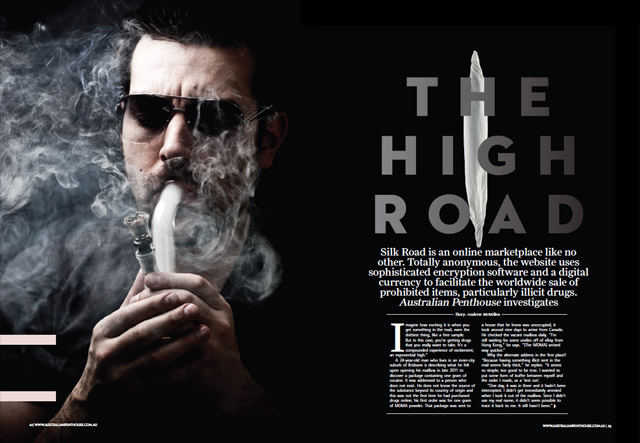
“Imagine how exciting it is when you get something in the mail; even the shittiest thing, like a free sample. But in this case, you’re getting drugs that you really want to take, and get high on. It’s a compounded experience of excitement; an exponential high.”
A 24-year old man who lives in an inner-city suburb of Brisbane is describing what he felt upon opening his mailbox one day in 2011 and discovering a package containing one gram of cocaine. It was addressed to a person who does not exist. He does not know the source of the substance beyond its country of origin. This was not the first time he had purchased drugs online; his first order was for one gram of MDMA powder. That package was sent to a house that he knew was unoccupied; it took around nine days to arrive from Canada. He checked the vacant mailbox daily. “I’m still waiting for some undies off of eBay from Hong Kong,” he says. “[The MDMA] arrived way quicker than that.”
Why the alternate address in the first instance? “Because having something illicit sent in the mail seems fairly thick,” he replies. “It seems so simple; too good to be true. I wanted to put some form of buffer between myself and the order I made, as a ‘test run’.
“One day it was in there and it hadn’t been intercepted. I didn’t get immediately arrested when I took it out of the mailbox. Since I didn’t use my real name, it didn’t seem possible to get traced back to me. It still hasn’t been.”
These orders were made using a website called Silk Road. It can only be accessed after installing anonymity-enabling software called Tor. All purchases are made using Bitcoin, a currency which only exists online and whose public transaction history can be untraceable if handled correctly.
My interviewee randomly discovered online mentions of Silk Road in May 2011, and pursued the intriguing concept all the way through to installing Tor and trading Australian dollars for Bitcoin; a process he calls “semi-prohibitive” owing to the persistence and tech-knowledge required to check all the boxes before users can place an order. In four transactions, my interviewee has ordered three grams of MDMA and three grams of cocaine at a cost of “close to AUD$700”.
So what motivated him to take a chance on buying illicit substances online from a complete stranger?
“I’m interested in taking drugs casually, but I hate the process,” he says. “I don’t know any dealers. Even if I want to get weed, I don’t know anyone, so it always becomes this drawn out process of finding someone who knows someone who knows someone. It’s a real pain in the arse. Whereas this way, it’s so direct and private. I didn’t leave my room, and then nine days later there was something in the mailbox that was for me. It’s discreet and exciting. Imagine the fun of shopping on eBay, but then you can also get high.”
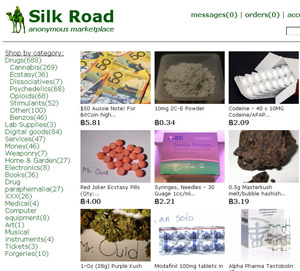 Visiting Silk Road for the first time, I feel a little like Alice falling down the rabbit hole. After downloading the correct Tor software bundle, I connected within five minutes. A warning appears at the bottom of the registration screen: “Be advised: This website is experimental. We do not guarantee your anonymity, protection from law enforcement in your jurisdiction, or protection from other users of this service. You and you alone are responsible for the risks associated with entering and using this website.” The site does not request any information from its users beyond a username and password; not even an email address. And then, you’re in.
Visiting Silk Road for the first time, I feel a little like Alice falling down the rabbit hole. After downloading the correct Tor software bundle, I connected within five minutes. A warning appears at the bottom of the registration screen: “Be advised: This website is experimental. We do not guarantee your anonymity, protection from law enforcement in your jurisdiction, or protection from other users of this service. You and you alone are responsible for the risks associated with entering and using this website.” The site does not request any information from its users beyond a username and password; not even an email address. And then, you’re in.
The site’s bright, clean design displays images of nine items for sale; among them, ‘red joker’ ecstasy pills, one-ounce of the ‘purple kush’ cannabis strain, a $50 Australian banknote and syringes. When I first visit the site in late August 2011, one bitcoin is worth USD$11.15; a fortnight later, the exchange rate has dropped to USD$6.18 per bitcoin.
The nine ‘featured’ items change upon each page refresh. A column on the left categorises the goods for sale: ‘drugs’ is split into sub-categories like ‘dissociatives’ (11 items for sale), ‘psychedelics’ (123 items), ‘stimulants’ (65) and the most popular category, ‘cannabis’ (237). Other categories include ‘digital goods’, ‘money’, ‘XXX’, ‘weaponry’ and ‘forgeries’.
At first, it’s a little overwhelming. What Silk Road [SR] offers is the online equivalent of strolling down a dim-lit alley filled with surly guys wearing heavy trenchcoats, except that you can contemplate purchasing their goods while lounging in your underwear, without fear of being stabbed.
Each page on the site generally takes a few seconds to load, regardless of the user’s connection speed, due to an overcrowded Tor network. A page called ‘how does it work?’ describes the site as “an anonymous marketplace where you can buy and sell without revealing who you are. We protect your identity through every step of the process, from connecting to this site, to purchasing your items, to finally receiving them”. Lengthy guides for both buyers and sellers are freely available. The latter guide states that “every precaution must be taken to maintain the secrecy of the contents of your client’s package. Creatively disguise it such that a postal inspector might ignore it if it was searched or accidentally came open.”
It concludes with a ‘final note’: “Regardless of your motivations, you are a revolutionary. Your actions are bringing satisfaction to those that have been oppressed for far too long. Take pride in what you do and stand tall.”
There’s an active and boisterous SR forum community, which is hosted off-site and requires an additional registration; this process requests an email address, but a note states that it doesn’t have to be a legit address.
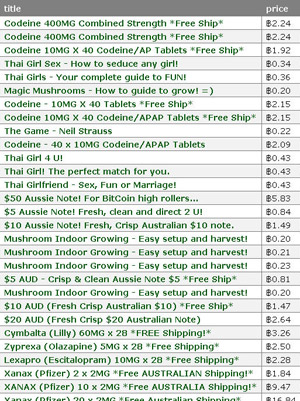 After poking around the site and smirking at some of the items for sale – condoms, an e-book of Neil Strauss’ pick-up artist classic The Game, military training manuals – I decide to engage with a few sellers by requesting interviews using the site’s private messaging system.
After poking around the site and smirking at some of the items for sale – condoms, an e-book of Neil Strauss’ pick-up artist classic The Game, military training manuals – I decide to engage with a few sellers by requesting interviews using the site’s private messaging system.
Within 10 minutes, three sellers respond enthusiastically to my request; one says, “I’ll even give you a media discount if you order.” The website’s administrator, who goes by the username Silk Road, also responds. “Sorry, we aren’t doing interviews at the moment,” he says. “Good luck.”
Of the 27 SR sellers I approach during a two-week period on the site, seven respond thoughtfully and at length to my questions. They are mostly based in the US and Canada, though one is Australian. All seven request that I don’t mention their usernames. A few prefer to conduct the interview using PGP text encryption, which adds another element of spookiness to the situation. Most of the sellers found their way to Silk Road after the site was covered online by Wired and Gawker in June 2011.
When I ask what they like about Silk Road, I’m met with a range of responses. “Being able to provide a safe and anonymous way for someone to purchase something that they choose to put into their body,” says one seller. “It’s nice how it turns drug dealing into an office job, with less risk and more stable demand while interacting openly with customers,” replies another. This focus on administrative duties is echoed by another seller, who says it’s “nice to have everything so organized and centralized, it really cuts down on the time spent per order which is a huge plus when you’ve got a mountain of them to work through.”
One source remarked aloud, ‘this is the future’, upon finding the site. “The free market has provided for one of the oldest needs in human history,” they elaborate. “[SR] removes the elements of danger that exist in in-person black market arrangements, and offered anonymity for all parties involved.”
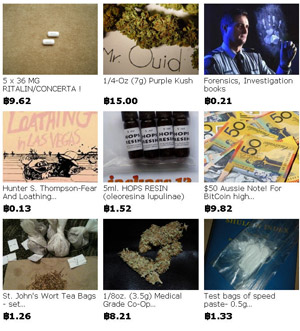 I ask what sellers don’t like about the service. One tells me, “while the majority of users are honest and trustworthy, you always have to keep your guard up. There are plenty of scammers here on SR.” Another is frustrated by the long wait between making a sale and receiving the bitcoins in their account. “It can take a while for people to finalize transactions, so the money gets stuck in escrow until the customer remembers to finalize, or it auto-finalizes after like 20 or so days.”
I ask what sellers don’t like about the service. One tells me, “while the majority of users are honest and trustworthy, you always have to keep your guard up. There are plenty of scammers here on SR.” Another is frustrated by the long wait between making a sale and receiving the bitcoins in their account. “It can take a while for people to finalize transactions, so the money gets stuck in escrow until the customer remembers to finalize, or it auto-finalizes after like 20 or so days.”
One seller is concerned about the silo-like nature of the site: “Having everything organized – vendor statistics easily accessible, reliance on a single server, etc – all makes any vendor, or even SR itself, a juicier target for LE [law enforcement].” An Australian seller replies, “I don’t like being out in the open. Even though I feel rather anonymous within SR, I could always make a simple mistake with my packaging or use of encryption that would give me away.”
A few of my respondents reveal that they have sold drugs in the real world. One dubs the online process “much easier” than face-to-face sales. “SR buyers have no info about me whatsoever. Whereas with a face-to-face transaction, a buyer might know my name, what I look like, the car that I drive, or the city that I live in. So if they get caught, LE goes up the food chain. Here on SR, there’s nowhere for LE to go.”
Another seller says SR is preferable because it “takes potential violence right out of the equation, and mitigates theft; you can’t exactly take someone to court for robbing you during a black-market trade, which is why there is so much violence. I prefer SR to offline, any day of the week.” One seller candidly replies, that SR is “better and cleaner. Customers are more educated and nice, and it leaves you more spare time to study, play with the kids, and clean the house. It’s telecommuting at its finest.”
None of the seven sellers I interviewed would detail how they package the illicit substances sent through the international postal system. A couple mentioned that it’s an unwritten law among SR sellers to not disclose such methods, though I learn by reading the forums that vacuum sealing is common. The young man from Brisbane who received MDMA and cocaine in the mail didn’t want to discuss the appearance of the packages he received, either.
All this illegal activity must be a rush, even if the process does become somewhat normalised due to the volume of orders that some sellers process. I have one final question. What does it feel like to sell illicit drugs over the internet to complete strangers?
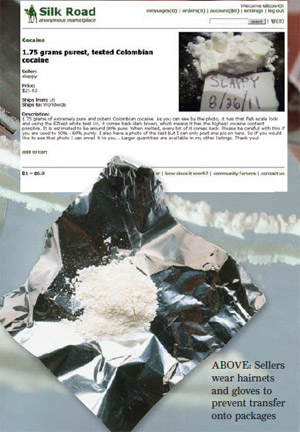 One replies, “honestly, it can be quite nerve racking. I have no idea if I just sent some illegal items to LE. That’s why it’s so important for a good vendor to use all precautionary tactics to keep important info away from them. Leaving no DNA or fingerprints, and sending from an area where you don’t live. It’s not unusual for a vendor to be wearing hairnets and multiple layers of gloves while packaging the material. If there is even a one-percent chance of some identifying marks on or inside that package, it will be thrown out.”
One replies, “honestly, it can be quite nerve racking. I have no idea if I just sent some illegal items to LE. That’s why it’s so important for a good vendor to use all precautionary tactics to keep important info away from them. Leaving no DNA or fingerprints, and sending from an area where you don’t live. It’s not unusual for a vendor to be wearing hairnets and multiple layers of gloves while packaging the material. If there is even a one-percent chance of some identifying marks on or inside that package, it will be thrown out.”
Another says, “It’s awesome. Most of the users on Silk Road are good people, and it’s always been a pleasure providing them goods that their corrupt governments have denied them. By simply living our lives and doing what we want to do, we break the government’s iron fist. It’s pretty satisfying.”
“It feels great,” agrees another. “I get to make a positive contribution in the lives of people who otherwise wouldn’t have access to drugs, such as old folks, and people in remote locations.” The seller shares some feedback received by a buyer that they found “really touching”. The feedback reads, “I don’t want to sound all sentimental and crap but in all honesty, my friends and I have become closer and happier with ourselves and each other, thanks to you and your stuff. It’s really been a bonding experience for everyone. We aren’t really the partying type and instead like to chill and talk for hours. Thanks to you, we have shared some amazing experiences.”
The seller tells me that “getting feedback like that makes those nights spent sweating over a hot vacuum sealer seem worthwhile!”
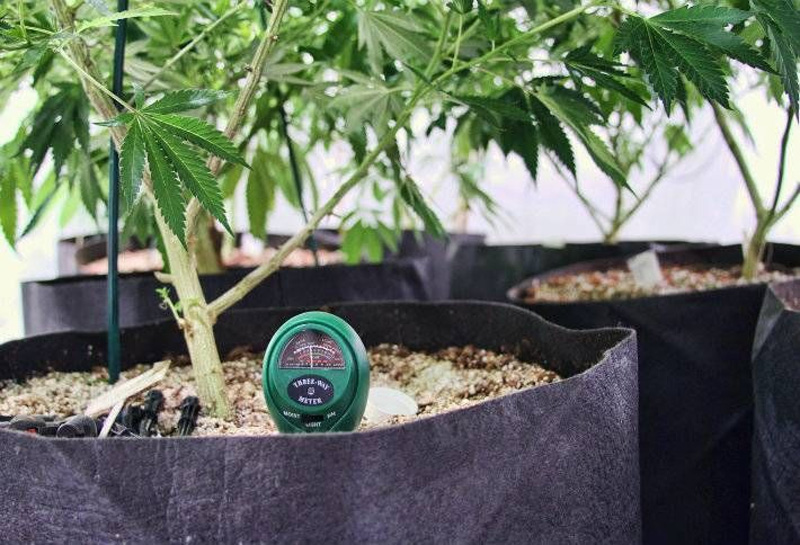
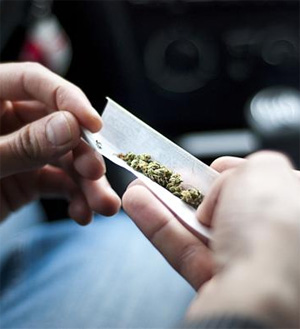 “Marijuana Use Most Rampant in Australia,” read a
“Marijuana Use Most Rampant in Australia,” read a



